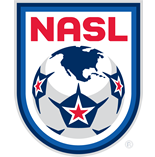Jason Riley: The Coach Who Gives The Rowdies Fuel to Burn
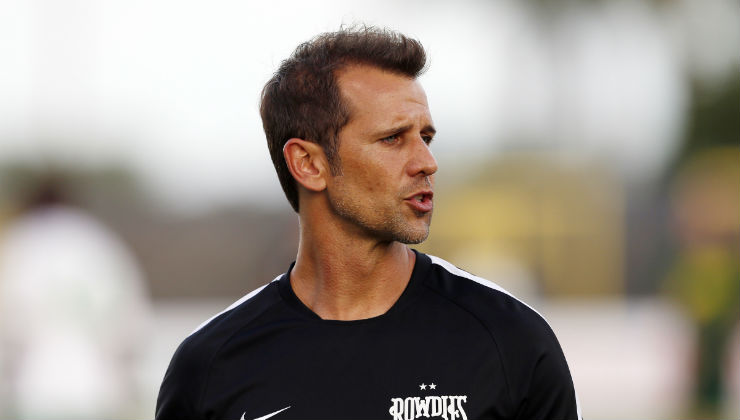
It was early Thursday morning and Jason Riley was in the midst of a 40-minute drive to work.
The conversation, perhaps whimsically, began with the focus on a single word: Oatmeal (only because he mentioned it on his Facebook page).
“I think it’s the breakfast of champions, at least in the athletic world,” said Riley, the strength and conditioning coach of the Tampa Bay Rowdies, who was referring to the gourmet version -- steel cut oats. “I eat it for dinner as well. It’s something that’s so easy to make, there are so many options with it, too. It’s a good fuel source to get ready for a long day and gives you sustained energy. That’s important for athletes. A lot of times I will prepare three to four days’ worth at a time and stick in the fridge.”
And his favorite complements? A little peanut butter, some cinnamon, sliced banana, and a bit of vanilla whey protein. Carbs, protein and fat.
“The guys ask all the time about what they should be eating for breakfast and I’m big proponent of having the fuel that’s right for the day, especially when you’re trying to get through a training session,” Riley said. “I try to get them away from cereals for more sustained energy.”
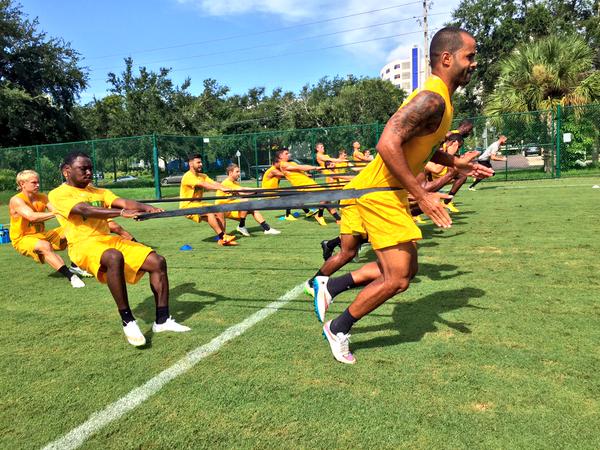 Riley is in his first full season working with the Rowdies, but he is a fixture on the Tampa/St. Petersburg sporting scene, having worked with professional athletes in baseball, football, tennis, and soccer. He first encountered Rowdies coach Thomas Rongen back when Rongen was leading the United States Under-20 men’s national team as it prepared for the 2007 FIFA U-20 World Cup with a player by the name of Freddy Adu. Of course, Adu signed on with the Rowdies last week and could see his first action in the NASL on Saturday in Tampa Bay’s game against visiting Fort Lauderdale.
Riley is in his first full season working with the Rowdies, but he is a fixture on the Tampa/St. Petersburg sporting scene, having worked with professional athletes in baseball, football, tennis, and soccer. He first encountered Rowdies coach Thomas Rongen back when Rongen was leading the United States Under-20 men’s national team as it prepared for the 2007 FIFA U-20 World Cup with a player by the name of Freddy Adu. Of course, Adu signed on with the Rowdies last week and could see his first action in the NASL on Saturday in Tampa Bay’s game against visiting Fort Lauderdale.
“My relationship with Thomas began with the U-20’s and was really good,” Riley said. “I have the utmost respect for him as a coach. He’s able to pull the best out of guys, he’s a great personality, very likable, a technician with understanding of the game at an amazing level. He has the ability to reach guys, and I think we have similar abilities in that way. For us, it’s about reaching players and helping develop them. So much of coaching youths or professionals at the highest level is really about developing players as better people, which makes it easier to manage. If you’re more likable they will play better for you knowing that there’s a relationship beyond coach and player – that you’re interested in them as a person and that’s what Thomas brings. He’s one of a kind.”
Riley earned an exercise science degree from the University of Nebraska-Omaha and served as the school’s athletic trainer for two years. In 2000, he moved to Bradenton, Fla., and took up residence at the IMG Academy as the associate director of performance at its International Performance Institute. That is also the location for past residency camps operated by U.S. Soccer. Riley moved to the Tampa Bay area in 2007 to become the director of performance at The Athletes Compound.
During his career, he has worked with elite athletes as they prepared for the NFL Scouting Combine; with the tennis stars John Isner, Maria Sharapova, and Tommy Haas; and with baseball players like Derek Jeter (who now lives in the Tampa area), Ryan Howard, and Carlos Quentin.
What was it like working with a superstar like Jeter?
“What set him apart is that I think he viewed everything as a professional, whether it was what he was drinking, how long he was sleeping, whatever,” Riley said. “The way he interacted with the people around him was unique because he viewed each person he surrounded himself with as an asset.
“This is the perfect story: The first couple of weeks I worked with him, in 2008, he called me. We had a meeting set for 6 a.m. because he likes to work out early. He called to say he would be a couple of minutes late. In working with professionals I never know what it means. Guys can say that, then show up 15 minutes or two hours later. He showed up three minutes late for training. He had respect for me as professional, that my time was just as valuable as his time. He treated everyone with such respect realizing that everyone was trying to help him to accomplish his dreams and goals. You don’t find that a lot really. It really elevated him to be the person he is and his integrity made him one of the top athletes.”
With the Rowdies, Riley faces the unique challenge of having to tailor his holistic approach to fitness and strength among about two dozen professional athletes. That is no easy task when dealing with a diverse roster of players from the four corners of the globe.
“I think each sport has its unique nuances, obviously soccer is a sport that has a lot more fueling needs because of the length and intensity of play,” Riley said. “The fuel and mindset components become very different. When you understand what the game is asking of each player you can get into their heads, in terms of training and nutrition. If you can’t find what that hot button is that motivates them then it’s hard to reach them to change habits.”
Riley is now working with the Rowdies four or five days a week, depending on whether the team played most recently at home in Al Lang Stadium, or was on the road. He has the players lifting weights twice a week, sprinkling in speed and agility work, some cross-training (like hitting a heavy speed bag), and a bit of yoga to increase flexibility and mindfulness. 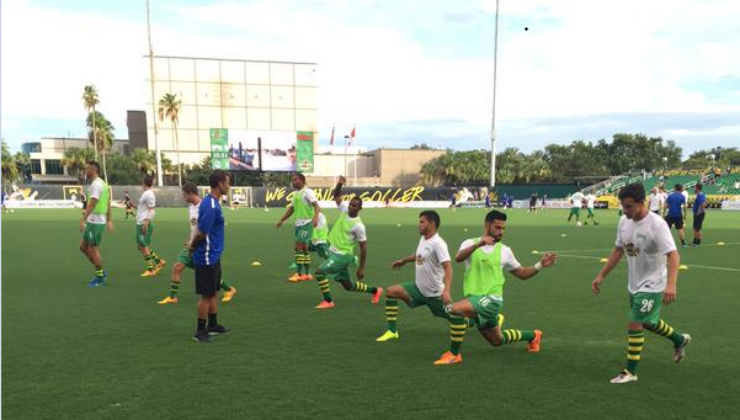
“I've known Jason for several years now going back to my time with the U-20 U.S. national team,” Rongen said in an email message. “He's a fantastic coach to have in the locker room, bringing energy to the club both on and off the field. Our team has been getting fitter as the season goes on and that is a product of Jason's hard work.”
Like his relationship with Rongen, Riley was with the youth national team when Adu was the team’s leader and star at the tournament in Canada. As most soccer fans know, the trajectory of Adu’s career hasn’t hit that early promise. It is the goal of Rongen and Riley to now help turn that around, offering Adu a chance to relaunch his professional career at the still young age of 26.
“Our ultimate goal is for Freddy to be a success here and play at a high level,” Riley said. “From an assessment by Thomas, myself, and Freddy, we all knew he wasn’t in his best condition from the standpoint of a true conditioning level, first-step quickness. What we talked about is using a four-to-six week period of making sure his foundation is set so we can limit injury. But more important is getting him at the level he needs to play at. He’s such a talented player. It wasn’t about him coming in immediately and saying it’s time for a game, but to build up a foundation to play at level where he can be an asset to the team. 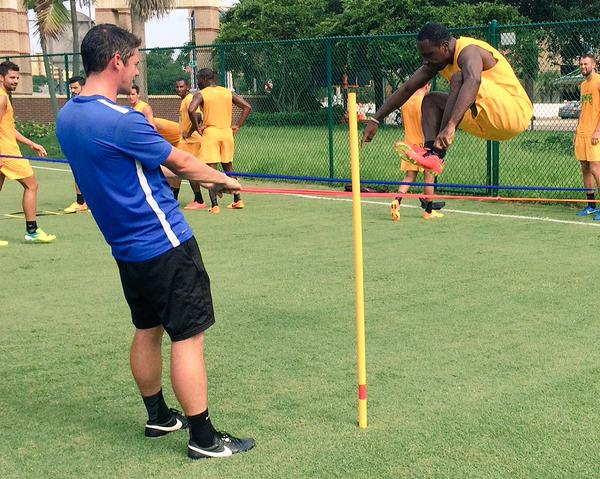
“He’s always been confident about his ability and that has not changed. I see a maturity that’s different from when I was dealing with a 17-18 year old. Having not seen him the last seven years it’s an understatement to say he’s matured. He’s been with a lot of different teams and had a lot of experiences. I’m sure it’s humbled him a lot as well. That’s a positive for Freddy. He knows what his role is going to be, that he doesn’t have to do everything, we’re not looking for him to carry the team. There will be a lot less stress on his shoulders.”
